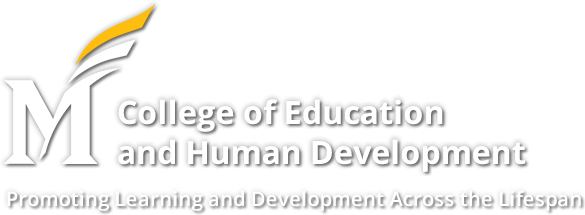College of Education and Human Development
See more news from the...
Media Inquiries
Getting Fit By Degrees: Mason's Exercise Science Program Expands
May 12, 2015

Jatin Ambegaonkar
The expanding fitness community has prompted George Mason University to offer two new degrees.
“People find CrossFit and enjoy it,” says Jatin Ambegaonkar, associate professor and operations director of George Mason’s Sports Medicine Assessment, Research, and Testing (SMART) Laboratory. “Then they want more education about fitness. We had to turn away potential students because we didn’t have a program for them. We saw a need, and the profession is growing.”
Potential students can be anyone from personal trainers to gym owners to those who want to study fitness. As with any exercise class, there’s more than one level—Mason is offering degrees tailored to both beginners and the more advanced.
The Wellness Practitioner concentration is for those with minimal or no prior education in health and human performance. The Advanced Practitioner concentration is for those with prior education. Both are offered through Mason’s Master of Science in Exercise, Fitness, and Health Promotion program in the Division of Health and Human Performance, College of Education and Human Development.
Both degrees emphasize putting the latest research into play.
“They’ll learn what people really need to know to be really fit,” says Ambegaonkar, who’s also coordinator of Mason’s Exercise, Fitness, and Health Promotion graduate program.

The SMART Lab at the George Mason University Science and Technology Campus is the site of cutting-edge research opportunities for graduate students in the Exercise, Fitness, and Health Promotion program. The public is invited to take advantage of SMART Lab assessments for running gait analysis and more at smartlab.gmu.edu/go.
Students are finding the road to fitness is a good career path.
“My dream job used to be a high school teacher and athletic trainer in Virginia Beach,” says Kaitlin Romm, middle school concussion education coordinator with the Mason-based ACHIEVES program. But hands-on experience working in concussion research has changed her goals.
“If I’m really dreaming, then I’d love to work in a lab that studies the brain and various variables that cause head trauma,” Romm says.
She graduated in 2013 with a BS in athletic training and is on schedule to graduate from the Exercise, Fitness, and Health Promotion master’s program in May 2016.
Amanda Cary, a graduate research assistant in the SMART Lab, a doctoral student in the PhD in Education Exercise, Fitness, and Health Promotion specialization, is working on 3D gait analysis and injury prevention. She’s also worked on concussion studies with Shane Caswell, executive director of the SMART Laboratory, and with an adolescent obesity weight management program.
Cary sees her future in teaching.
“The incredible faculty that I have had the opportunity to work with has inspired me in so many ways,” she says. “I want that opportunity to do the same when I have found a job after the completion of my program.”
For additional information:
- CEHD Communications: cehdnews@gmu.edu
- School of Recreation, Health, and Tourism: rht.gmu.edu
- Exercise, Fitness, and Health Promotion program: rht.gmu.edu/efhp
About the college:
George Mason University's College of Education and Human Development (CEHD) includes two schools: the Graduate School of Education, one of the most comprehensive education schools in Virginia, and the School of Recreation, Health, and Tourism. CEHD offers a full range of courses, certificates, and degree programs on campus, online, and on site to more than 4,000 students each year. CEHD is fully accredited by NCATE, and all licensure programs are approved by the Virginia Department of Education. George Mason University, located just outside of Washington, D.C., is Virginia's largest public research university.
Follow CEHD on Facebook at www.facebook.com/MasonCEHD or Twitter at @MasonCEHD.
